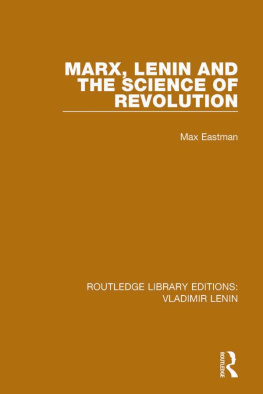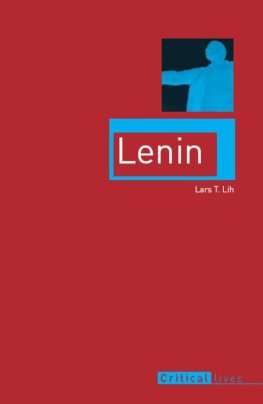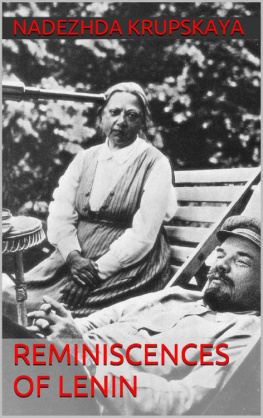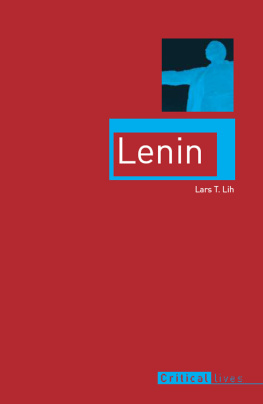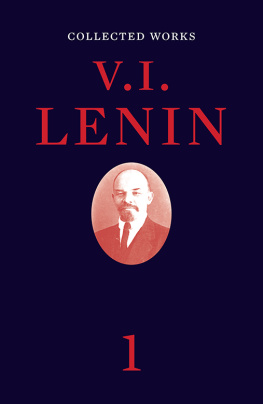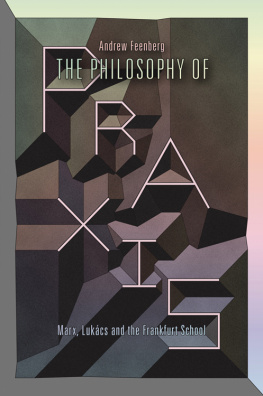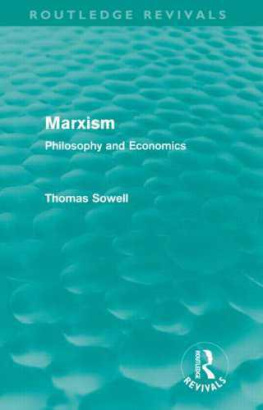ROUTLEDGE LIBRARY EDITIONS: VLADIMIR LENIN
Volume 1
MARX, LENIN AND THE SCIENCE OF REVOLUTION
MARX, LENIN AND THE SCIENCE OF REVOLUTION
MAX EASTMAN
First published in 1926 by George Allen & Unwin Ltd
This edition first published in 2017
by Routledge
2 Park Square, Milton Park, Abingdon, Oxon OX14 4RN
and by Routledge
711 Third Avenue, New York, NY 10017
Routledge is an imprint of the Taylor & Francis Group, an informa business
1926 Max Eastman
All rights reserved. No part of this book may be reprinted or reproduced or utilised in any form or by any electronic, mechanical, or other means, now known or hereafter invented, including photocopying and recording, or in any information storage or retrieval system, without permission in writing from the publishers.
Trademark notice: Product or corporate names may be trademarks or registered trademarks, and are used only for identification and explanation without intent to infringe.
British Library Cataloguing in Publication Data
A catalogue record for this book is available from the British Library
ISBN: 978-0-415-79274-5 (Set)
ISBN: 978-1-315-20438-3 (Set) (ebk)
ISBN: 978-1-138-71262-1 (Volume 1) (hbk)
ISBN: 978-1-315-20003-3 (Volume 1) (ebk)
Publishers Note
The publisher has gone to great lengths to ensure the quality of this reprint but points out that some imperfections in the original copies may be apparent.
Disclaimer
The publisher has made every effort to trace copyright holders and would welcome correspondence from those they have been unable to trace.
MARX, LENIN AND THE SCIENCE of REVOLUTION
BY
MAX EASTMAN
LONDON: GEORGE ALLEN & UNWIN LTD.
RUSKIN HOUSE, 40 MUSEUM STREET, W.C.1
First published in 1926
(All rights reserved)
THIS book is the principal fruit of a visit to Soviet Russia. It is also the completion of a task which I began ten years ago in a series of articles in The Masses called Towards Liberty, The Method of Progress. I was deterred from finishing those articles by many things, but chiefly by my ignorance of the international literature of Marxism. During my visit to Russia I succeeded in reducing the proportions of this ignorance. I also became convinced that nothing I could do is more important than to finish that task. It now entails a criticism of certain phases of the revolutionary dictatorship in Russia, but I trust it will be obvious that this criticism is sympathetic, and in no sense a political attack.
MAX EASTMAN.
IT seems evident that conscious thought developed in the course of evolution only when it became needful as a means of survival. Desire in its simple nature is undefined and unconscious, and the lower forms of life satisfy their desires by continuing in a state of random activity, until they come by chance into bodily contact with a satisfaction. Higher forms of life develop feelers with specialized sensitivity, which enable them to explore the environment without submitting their whole body to danger. They develop organs of smell and sight and hearing which enable them to detect a satisfaction, or apprehend a danger, at a considerable distance in space and time. And it is in connection with these organs that the value of a conscious act of perception begins to be apparent. For the essence of such perception is the interpretation of a present fragment of sensation upon the basis of past experience. The smell of food is not food, and the sight of danger is not dangerous. But if by virtue of memory and imagination, the smell of food means food, and the sight of danger means danger, then the organism can satisfy itself or escape, without making in each case a complete experiment.
But even here it cannot learn anything new except by the method of random experimentationby the method, that is, of trying out in action every meaning that is suggested. And thought, in so far as it is distinguished from the mere act of perception, is distinguished by a moment of suspense during which the suggested meaning, or more than one suggested meaning is tried out inside the head. Thought is tentative action; it is action in the process of formation. It is adjustment, delayed in order that it may perfect itself and relate itself with safety to a larger and more complex environment.
Some such conception of the origin and nature of thought, is forced upon the genetic psychologist, not only by the central tendency of biological science, but by an experimental study of the intelligence of infants and animals. Indeed the very employment of experiment in these fields, implies an instrumental conception of intelligence. For it is only by setting before the infant or the animal a goal of desire, and observing his efforts, to attain it, that any experiment can be made.
Moreover, if we study in our own minds any simple example of thinking, we are led to a similar conception. We button our clothes unconsciously so long as all is in order and the process goes smoothly to its end; but if a button is missing, we become conscious of the process and we think. And our thinking takes a form corresponding to the situation in which it arose. It is an interpretation of the factual difficulty in the light of the desired end, a trying out in imagination of plans which spontaneously suggest themselves for arriving at the end on the basis of the existing facts.
What complicates this process, and gives rise to so many problems about thinking, is a certain disposition men have to exercise this function for its own saketheir pleasure in meditation, and their instinctive curiosity, which make the mere definition of facts itself a desired end. The people who first studied thought, and advanced theories about it, were themselves very strong in this disposition and instinct. They were great meditators, great investigators. And so naturally they imagined that thought in its original and most general form is pure meditation, or a perfectively disinterested attempt to define facts. It is so far from this, that we may even ask the question whether pure meditation is very different from pure day-dreaming, and whether it is possible to define a fact of any complexity, and prove that the definition is valid, except in relation to some purposive activity. At least it is with an organ formed to function as an integral part of purposive activities that we meditate; it is with an instrument of interest that we seek to satisfy our disinterested curiosity. Working hypotheses are the original form of its knowledge, and experimental verification is originally its only truth.

